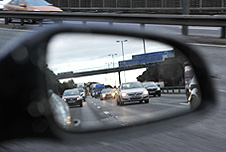
Cut to the chase
(Finn and Feifei are in the car going to work)
| Finn: | Thank you for driving me to work today, Feifei. It's a nice car. |
| Feifei: | Yeah, it's brand new. |
| Finn: | It must have cost a lot of money. By the way, I noticed you had a meeting with the boss yesterday ... and you look very happy today. Good news? |
| Feifei: | Yes, very good news. First the boss offered me ... |
| Finn: | A pay rise? |
| Feifei: | Tea. And then he offered me ... |
| Finn: | A promotion? |
| Feifei: | Biscuits. And then he asked me ... |
| Finn: | He asked you if you want a post abroad? |
| Feifei: | If my chair was comfortable. |
| Finn: | Oh, come on Feifei, cut to the chase! |
| Feifei: | Cut to the chase!? Is there anyone chasing us? Let's go faster. See if he is still behind us. |
| Finn: | Slow down, Feifei! Nobody is chasing us! |
| Feifei: | Okay, okay! |
| Finn: | Oh. That was quite an adventure. In English, we say "cut to the chase" when we want to hear the most important piece of information; we want someone telling us something to get to the point! |
| Feifei: | Ah! It might come from the movies. The chase is usually the most exciting part. |
| Finn: | Yes. Let's hear some examples: |
Feifei: So that's what "cut to the chase" means.
| Finn: | Sure. So Feifei "cut to the chase" and tell me: What did the boss offer you? |
| Feifei: | I've just told you. |
| Finn: | What? What was it? |
| Feifei: | He asked me if my chair, the one by my desk, was comfortable. So I told him it wasn't. And he offered me a new chair so that I can work longer hours in comfort. |
| Finn: | Is that all!? |
| Feifei: | Yes. I'm always complaining about my bad back. |
| Finn: | Well. I don't have a bad back but I'm aching for a pay rise. Let's go to the office. Bye. |
| Feifei: | Bye. |
| (car starting) |